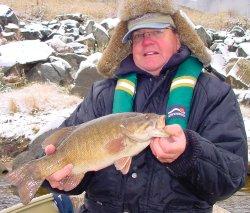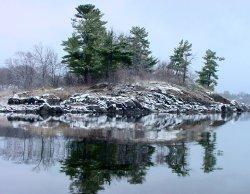Well folks, here's the last update I'll be posting for a week or maybe two. Starting Sunday I'll be going into hunting mode for a week or so and when I get that out of my system, I'll get started with some ice fishing articles and forecasts for the upcoming season. I wouldn't be surprised to be talking about freeze up within the next few weeks.
The water temperatures continue to fall and even though we're looking at surface temps now ranging from 41 to 46 degrees, fish can still be caught and there are a handful of hearty anglers chasing them. We've spent the past few days Walleye fishing and there's really no change from the updates I've already posted below. We are still catching fish, but be prepared for some light bites and lots of half hearted "pick ups" where the fish lose interest and drop your bait.
I've been struggling with a way to teach folks how to play see-saw with the fish until they finally inch their way up the minnow and get into hooking range. My best advice is to use the lightest jig you can get away with to help prevent the fish from "dropping" the bait. If you keep a bit of up-pressure on the fish as they nibble, these lighter jigs will tend to hover within their strike range longer and if they drop the bait, you'll have a better chance of teasing them back on to it again. Stinger hooks are okay, but I feel that we get less bites and more snags when we're using them so even if you get a higher percentage of hook ups, the end result is the same number of fish caught. I prefer to teach the "patience in hook setting method". Your other option would be to fish the live bait rigs that allow you to feed out line giving the fish more time to finish their meal before you pounce on them. This is working better on some lakes than others though and you'll have to experiment to see if its right for your conditions.
Last weekend we fished two distinctly different patterns, both successful in their own way. On Saturday we fished deeper water using live bait rigs tipped with creek Chubs and large rainbow Chubs in the five to seven inch range. This was an annual "big fish" trip where we didn't plan or expect to catch the eater size fish. Targeting fish in the 22 to 35 foot depth ranges is the best way to single out these small schools of larger fish. We had sparse action during the mid day, but toward evening and up to dark there was a consistent run of nice fish, with the largest coming in at 28 inches. You can read more about fishing this live bait method by clicking here.
On Sunday, we fished for "eaters" using jig and minnow combinations in shallower water of 8 to 12 feet. We found that it was a lot easier to get a bite, than to set the hook. The Walleye were fairly willing to pick up the minnow, but we had to nurse them on to the jig before we could get a hook set. I tried to get Walleyes interested in Night Crawlers but except for a couple of half hearted pick ups, this particular approach fell flat this time.
One sure remedy for fishing the "post turnover" period is to head for your favorite river. Fish in rivers live by a different set of rules than their lake cousins and sometimes when lake fishing is sluggish, you can count on the river fish to be a bit more aggressive. Since river water is constantly churning, changing or "turning over", fish are never influenced by a single, sudden change as they are in lakes. Instead their location is influenced by the food supply, water level and temperature.
We wanted to finish off the season (my guiding season) with a bang so we headed for the Rainy River. Smallmouth and Walleye fishing continues to be good upstream from Pelland and as luck would have it, the fish were cooperative. My customer had hoped to catch a Sturgeon and as a bonus, he hooked into a nice Sturgeon. Walleyes for a fish fry came intermittently while we fished the Smallmouth Bass on the rocky edge of deeper water holes. Fish location varied form time to time, but we caught most of the fish in 8 to 10 feet of water adjacent to a deeper hole.
Our best presentation was a 1/4 ounce jig head tipped with minnows. I brought shiners, rainbows, creek chubs and fatheads. We started fishing with the fatheads and got into action. We never even opened up the bags of shiners or rainbows. The fish did not seem too fussy about minnows. They were still biting on the light side and we still had a lot of fish drop the bait, lots of patience and a lighter than normal hook set pays off.


